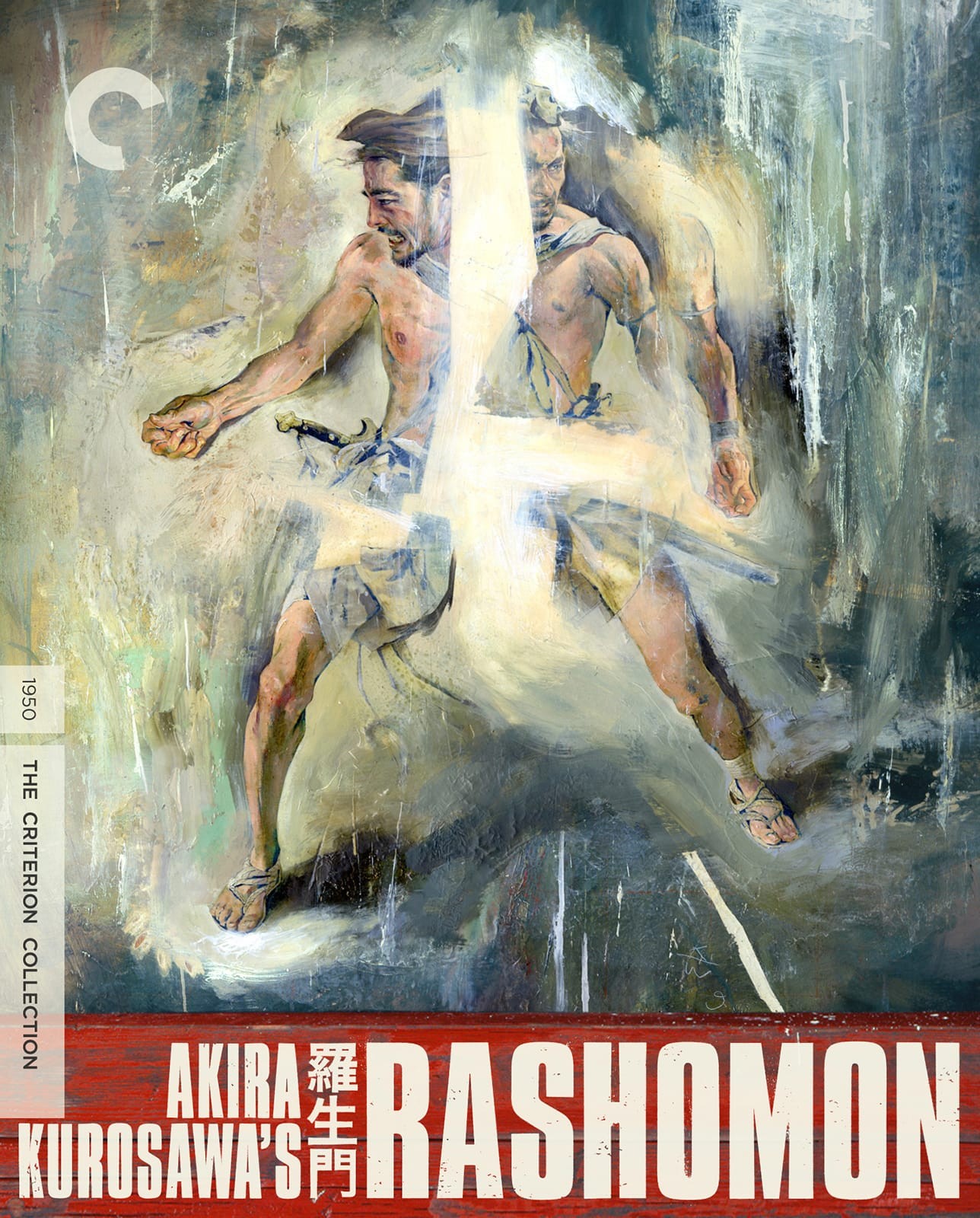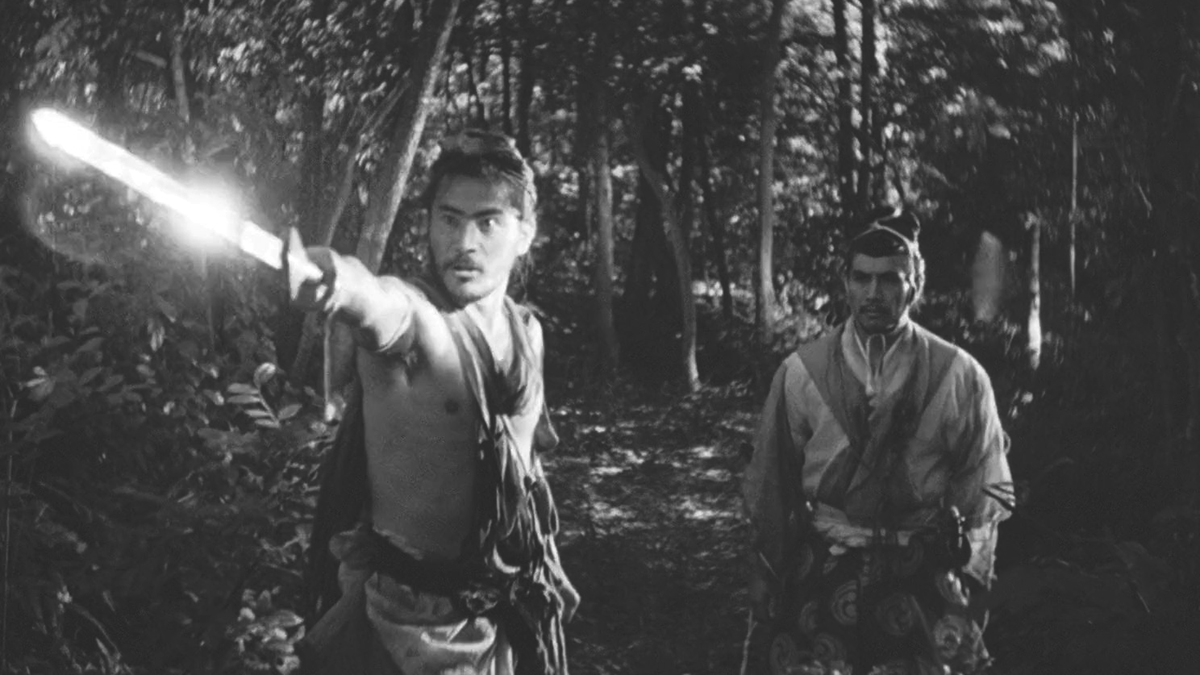Rashômon (1950)
Film and Plot Synopsis
Rashomon begins as heavy rain pours monotonously out of a dark sky. Under Kyoto’s once-glorious front gate, a poor woodcutter and a faithful priest gather around a feeble campfire to share their take on a mysterious murder with a wet commoner. Out in a lush bamboo forest, a valiant samurai died as the hands of the notorious bandit, Tajomaru. He then sexually assaulted the dead man’s wife. Before court and through a series of flashbacks, four strikingly different points-of-view inextricably interweave with half-truths, cover-ups, and the supernatural, to further blur the lines between memory and fact. Who is the evil-doer behind this intricate tale? In the end, only your personal perspective and bias can decide.
‘Rashomon’ Movie Summary
 The message of Rashomon is that everyone is the potential hero (or villain) of their own story. Rashomon is the tale of the death of a samurai as told from the different viewpoints of a woodcutter, a bandit, the samurai, and the samurai’s wife.
The message of Rashomon is that everyone is the potential hero (or villain) of their own story. Rashomon is the tale of the death of a samurai as told from the different viewpoints of a woodcutter, a bandit, the samurai, and the samurai’s wife.
Our tale begins on a rainy day at the Rashomon gate in 18th century Japan. There, a woodcutter, a priest, and a commoner discussing the confusing events surrounding the death of a samurai deep in the woods. The woodcutter discovered the body, and he notified the authorities. Later, he testified to this during the investigation. The film proceeds to tell us the tale from the perspective of each of the other witnesses.
First, we hear the story of the bandit; the man who was found with the horse and the weapons of the samurai. The bandit tells the story of becoming overcome with lust for the samurai’s wife. He convinces the samurai to leave the mountain trail in the promise of finding a supply of ancient swords. Once deep in the woods, the bandit subdues the samurai, and ties him up. The bandit then leads the samurai’s wife to the grove, and after initially fighting off the bandit, he seduces her.
The wife, filled with shame, then begs the bandit to duel her husband to the death to save her from her dishonor. The bandit frees the samurai, and the two men duel. Ultimately, the bandit is victorious, and kills the samurai. The wife runs into the woods, and the bandit collects the samurai’s property, save an expensive dagger that the wife tried to use against him.
Next, we hear from the samurai’s wife. She tells a different tale. She states that the bandit raped her, and then ran off. Left alone with her husband (who is still tied up), she tells how her husband stared at her in cold disdain, even as she begged him for forgiveness. She frees her husband, and begs him to kill her so she would be at peace, but he continues to look at her with loathing.
She tells investigators that the look disturbed her so much that she fainted with the dagger in her hand. However, when she awoke, she found her husband dead with the dagger buried in his chest. She states that she attempted to kill herself but failed in all her efforts.
Additionally, we hear from the samurai himself, whose story is told through a medium. The samurai states that after the bandit raped his wife, he asked the samurai’s wife to leave with him. She accepted his offer, and asked the bandit to kill her husband in exchange, so that she would not feel the guilt of belonging to two men.
The bandit, offended by the request, grabs her, and asks the samurai if he wanted the bandit to kill his wife or let her go. The wife escapes and flees into the woods, and the bandit is not able to find her. Later, the bandit returns and frees the samurai, who takes his wife’s dagger and kills himself with it. Later, someone removed the dagger from his chest.
Finally, we hear the confession of the woodcutter. You see, the woodcutter did not just find the samurai’s body, as he told investigators, but actually observed the incident completely. According to the woodcutter, he observed the rape. But afterwards, the bandit begged the wife to marry him, but the wife freed her husband instead. Her husband was not initially willing to fight the bandit for his wife, as he did not want to risk life for a “spoiled” woman. The wife then belittles both men, stating that they are not real men, and that real men would fight for a woman’s love. She manipulates the two men into fighting each other in a haphazard and comical way. Ultimately, the bandit is successful, and kills the samurai. The wife flees in horror, and the bandit collects the samurai’s sword, and limps off into the woods.
The film then cuts back to the woodcutter, the priest, and the commoner still at the Rashomon gate. The sound of a crying baby interrupts their discussion. On the other side of the gate, they find the baby abandoned in a basket. The commoner takes a kimono and an amulet that have been left for the baby.
Incensed at his thievery, the woodcutter yells at the commoner. However, the commoner chastises him, and calls him a hypocrite. The commoner has figured out that the woodcutter is the one who stole the valuable dagger from the scene of the murder. The commoner leaves the Rashomon gate, claiming that all men are motivated only by their own self-interest.
The priest is left to question his faith in humanity. When the woodcutter reaches for the baby, and states that he will raise the child, the priest is skeptical. However, the woodcutter explains that he has six children of his own, and that he will gladly raise the child. The revelation of the large family casts the theft of the dagger in a new light, and the priest hands over the child to the woodcutter; his faith in humanity restored. The film closes with the woodcutter walking home with the baby.
Additional Film Information
- Add the film to your collection today!
- Listen to our CRITERION CRITICS Review
- Listen to our MOVIE HOUSE MEMORIES Review
- Rashomon Criterion webpage
- Peruse IMDb’s article on Rashomon
- Learn more Rashomon information at Wikipedia
- Get Rashomon numbers at Box Office Mojo
- Find out what people think about Rashomon at Metacritic
- Read Rashomon reviews from the folks at Rotten Tomatoes
Rate the Film!
Our Rating
Our Rating
Daiei Motion Picture Company released Rashomon to theaters on August 25, 1950. Akira Kurosawa directed the film which starred Toshirô Mifune, Machiko Kyô, and Masayuki Mori.

Nice to see more Kurosawa reviewed. Guessing Patrick picked it?
Yep. He loves his Kurosawa…but it is a really great one to pick.